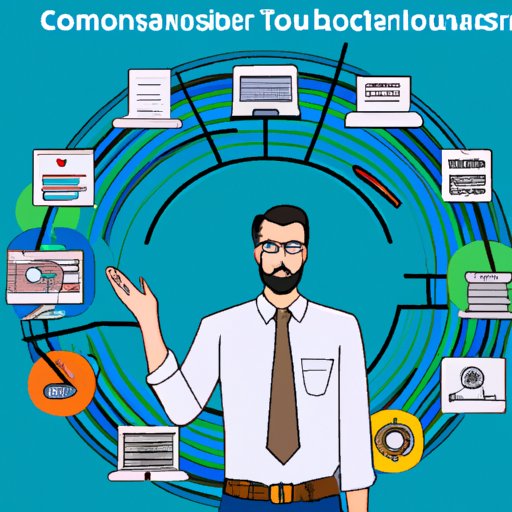Introduction
Computer science teachers provide instruction in areas such as programming, web design, and software development. They help students understand the fundamentals of computing and how technology can be used to solve problems. Becoming a computer science teacher requires dedication and hard work, but it can also be an incredibly rewarding career. In this guide, we’ll explore the steps needed to become a computer science teacher.
Research the Requirements to Become a Computer Science Teacher
Before you begin your journey to becoming a computer science teacher, it’s important to understand the requirements and regulations in your area. Each state has its own rules regarding teacher certification, so it’s essential that you research local and state regulations.
In addition, each school district may have different requirements for computer science teachers. For example, some districts may require a master’s degree while others may only require a bachelor’s degree. It’s important to understand these requirements before you start the process.
It’s also important to understand the qualifications and certifications needed to become a computer science teacher. According to a study by the National Center for Education Statistics, “teachers who teach computer science courses must have specialized knowledge in the field, including a broad understanding of computer systems and applications.” Additionally, the study found that “teachers should have a solid background in mathematics, particularly algebra and calculus, as well as programming languages.”

Prepare for the Necessary Exams and Licensure
Once you’ve researched the local and state regulations, it’s time to start preparing for the necessary exams and licensure. The most common exam is the Praxis Core Academic Skills for Educators, which tests your knowledge of reading, writing, and mathematics. Depending on the state, you may also need to take additional tests such as the Subject Assessments or the Principles of Learning and Teaching.
In addition to the exams, you’ll also need to obtain a teaching license. To do this, you’ll need to submit an application to your state’s licensing board. Once your application has been approved, you’ll be able to start teaching.
If you’re feeling overwhelmed by the thought of taking exams and obtaining a license, don’t worry. There are many resources available to help you prepare. Consider taking courses or workshops to brush up on the material, or utilize online tutorials and practice tests to get comfortable with the format of the exams.
Gain Experience in the Field of Computer Science
Gaining experience in the field of computer science is an important step in becoming a computer science teacher. Consider working in an IT or computer science-related field to gain hands-on experience. This will not only help you understand the material better, but it will also give you the opportunity to network with other professionals in the field.
You can also gain valuable experience through internships or volunteer opportunities. These types of programs can provide invaluable insight into the world of computer science, and they can also help you build your resume and portfolio.
Consider Obtaining a Master’s Degree or Higher in Computer Science
Obtaining a master’s degree or higher in computer science can open up more job opportunities and increase your salary potential. Research schools and programs that offer a master’s degree in computer science, and consider whether this is the right path for you.
A master’s degree can provide you with greater knowledge and expertise in the field, which can make you a more competitive candidate when applying for jobs. It can also open up opportunities to teach at the college level. Additionally, a higher degree can provide access to more advanced tools and technologies, which can help you stay ahead of the curve in the ever-evolving world of computer science.

Develop Your Teaching Skills and Knowledge
In addition to gaining experience in the field of computer science, it’s important to develop your teaching skills and knowledge. Take courses on teaching methods and utilize online resources and tutorials to brush up on your skills. You can also read books and articles related to teaching computer science.
It’s also important to stay up-to-date on the latest technologies and trends in computer science. Subscribe to newsletters and blogs, and follow industry experts on social media. This will help you stay informed and ensure that you’re teaching your students the most relevant information.

Network with Other Education Professionals in the Field
Networking is an important part of becoming a computer science teacher. Attend conferences and seminars, and join professional organizations such as the Association for Computing Machinery (ACM) or the International Society for Technology in Education (ISTE). These organizations can provide valuable resources and support, and they can also help you make connections with other professionals in the field.
Conclusion
Becoming a computer science teacher requires dedication and hard work, but the rewards can be great. By researching the requirements, preparing for the necessary exams and licensure, gaining experience in the field, and networking with other education professionals, you can set yourself up for success. With the right preparation and training, you can become a computer science teacher and make a difference in the lives of your students.
(Note: Is this article not meeting your expectations? Do you have knowledge or insights to share? Unlock new opportunities and expand your reach by joining our authors team. Click Registration to join us and share your expertise with our readers.)
